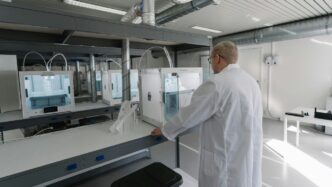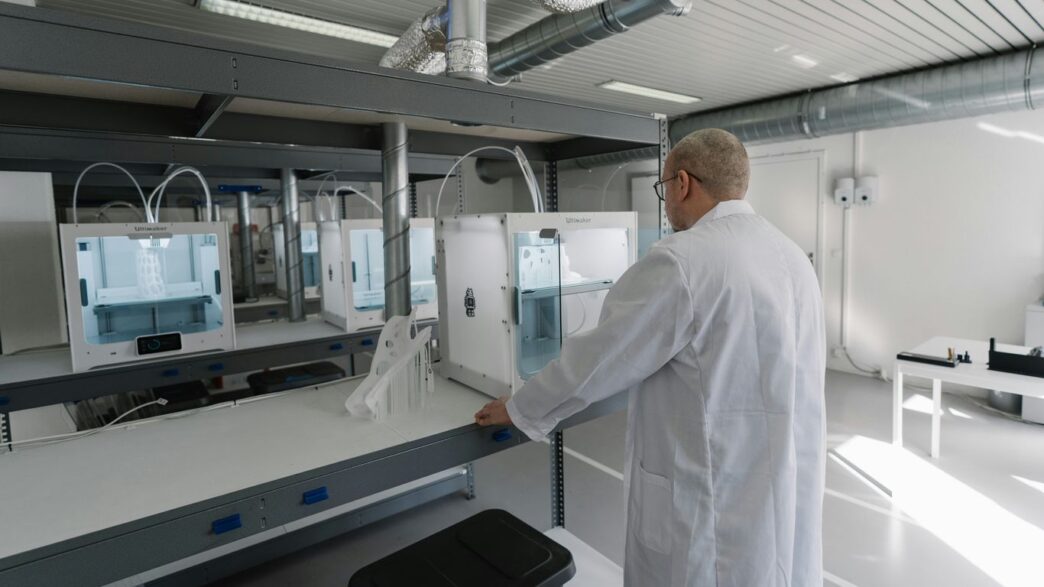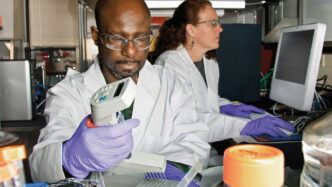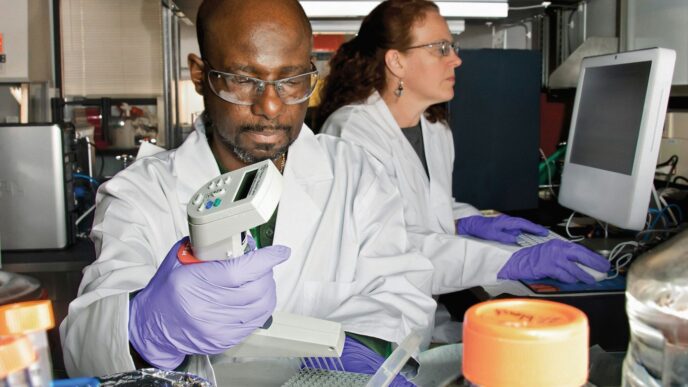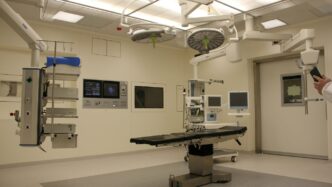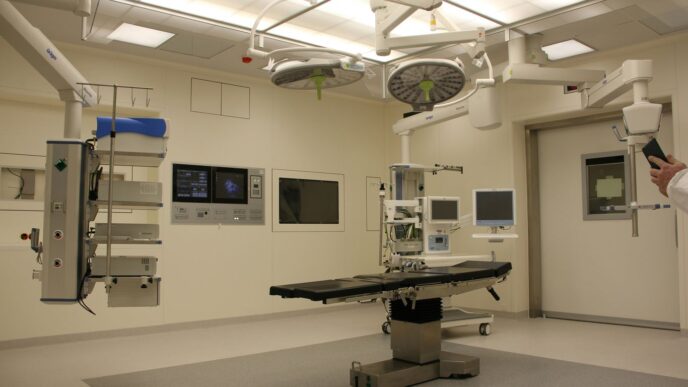Germany’s biotech sector is really taking off, with lots of new companies doing some pretty amazing work. We’re seeing a lot of smart people focusing on new ways to discover drugs, fix genetic problems, and even build living things with science. It’s an exciting time to see what these German biotech companies are coming up with.
Key Takeaways
- Germany is a major player in Europe’s biotech scene, benefiting from good research and government help.
- Big investment money is flowing into German biotech startups, especially those using AI for drug discovery and working on gene therapies.
- Partnerships with large pharmaceutical companies are a big deal for German biotech firms, helping them get their products to market.
- Companies need to be smart about rules and how they plan to sell their products to be successful in Germany.
- New areas like Augsburg are becoming important spots for biotech innovation in Germany, attracting attention from investors.
The Thriving German Biotech Landscape
Germany’s biotech sector is really something else, a major player on the European stage. It’s part of what people are calling the ‘European Biotech Valley,’ which also includes places like Switzerland and the UK. Together, these areas pull in a big chunk of all the money invested in biotech across Europe – like 40% of it, which is pretty significant.
So, why is Germany so good at this? Well, a few things are working in its favor. For starters, the government here seems to be pretty keen on supporting science and innovation. There are a lot of research institutions and universities that are doing top-notch work, and that creates a good environment for new companies to get started. Plus, venture capital firms are definitely noticing. They’re putting more money into German biotech startups, especially those with really promising ideas.
It’s not just about the money, though. Germany has a reputation for being good at getting things done, especially when it comes to regulations and making sure new treatments actually make it to patients. This kind of expertise is super important for biotech companies that are trying to grow and sell their products.
Here’s a quick look at how Germany stacks up:
- Germany’s Position in the European Biotech Valley: Germany is a core part of Europe’s biotech hub, alongside Switzerland and the UK. This region is a magnet for investment and innovation.
- Government Support and Research Institutions: Strong backing from the government and a network of excellent research facilities provide a solid foundation for biotech development.
- Venture Capital Interest in German Biotech: Investors are increasingly looking at Germany, recognizing the potential for high returns in the country’s growing biotech industry.
Key Investment Trends in German Biotech
It feels like every week there’s news about a German biotech company raking in serious cash. The investment scene here is really picking up steam, and it’s not just small amounts either. We’re seeing bigger and bigger funding rounds, which tells you investors are feeling pretty good about what’s happening in Germany’s life sciences sector. This surge in capital is fueling some pretty exciting advancements, especially in areas like gene therapy and AI-driven drug discovery.
Funding Rounds for German Biotech Startups
When you look at the numbers, it’s clear that German biotech startups are getting noticed. The amount of money being poured into these companies has been growing steadily. It’s not uncommon now to see Series A rounds that are quite substantial, often in the tens of millions of euros. This is a big change from just a few years ago. What’s driving this? Well, it’s a mix of things, including strong research coming out of German universities and a growing number of experienced entrepreneurs who know how to build and scale these kinds of businesses.
Venture Capital’s Role in Biotech Growth
Venture capital firms are really the engine behind a lot of this growth. They’re not just providing money; they’re often bringing in valuable advice and connections. Many of these firms have specialized teams that understand the complexities of biotech, from navigating clinical trials to getting regulatory approval. They’re looking for companies with solid science, a clear plan to get their products to market, and a team that can execute. It’s a competitive space, but for the right companies, the capital is definitely available.
Attracting Big Pharma Partnerships
Beyond venture capital, big pharmaceutical companies are also playing a significant role. They’re actively looking to partner with or acquire promising biotech startups. These partnerships can take many forms, like co-development agreements or licensing deals. For startups, landing a deal with a major pharmaceutical player can mean not only a significant cash injection but also access to resources and expertise that can speed up development and market entry. It’s a way for these larger companies to bring in fresh innovation, and for the startups, it’s a huge validation and a pathway to broader reach.
Innovation Drivers for German Biotech Companies
Germany’s biotech scene is really buzzing with new ideas, and a few key areas are driving a lot of the excitement and investment. It’s not just about having a good idea anymore; it’s about how that idea can be developed and brought to people who need it.
AI-Driven Drug Discovery in Germany
Artificial intelligence is changing how we find new medicines. Instead of years of trial and error in labs, AI can sift through massive amounts of data to spot potential drug candidates much faster. German companies are getting good at this, using AI to speed up everything from identifying targets for new drugs to predicting how effective they might be. This means fewer dead ends and a quicker path to treatments. It’s a big shift that’s making drug development more efficient and potentially less costly.
Gene Therapy Advancements
Gene therapy is another area where Germany is making waves. The idea is to fix diseases at their source by changing a person’s genes. We’re seeing a lot of progress in treating genetic disorders, certain cancers, and rare conditions. Companies are working on making these therapies safer and more accessible. Getting these treatments approved and manufactured at scale is a big hurdle, but the potential to cure diseases that were once untreatable is huge. It’s a complex field, but the breakthroughs are really starting to add up.
Synthetic Biology Applications
Synthetic biology is like engineering biology. It involves designing and building new biological parts, devices, and systems, or re-designing existing ones for useful purposes. In Germany, this is being applied in various ways, from creating sustainable materials and biofuels to developing new diagnostic tools and even novel therapeutics. Think of it as using biological building blocks to create solutions for a wide range of problems. The flexibility of synthetic biology means it can be adapted to many different industries, making it a really versatile area of innovation.
Navigating the German Biotech Market
So, you’ve got a brilliant biotech idea brewing in Germany, and you’re wondering how to actually make it a reality. It’s not just about the science, right? There’s a whole other layer of getting your product out there.
Regulatory Expertise for Market Entry
First off, you’ve got to deal with the rules. Germany has its own set of regulations, and understanding them is pretty important if you don’t want to hit a wall later. Think about getting advice from people who really know the ins and outs of getting medical stuff approved. It can save you a lot of headaches down the road. Having a solid plan for clinical trials and approvals is a big deal for investors, so don’t skimp on this part. It’s all about showing you have a clear path to getting your innovation to the people who need it.
Commercialization Strategies for Biotech
Once you’ve got the green light, how do you actually sell it? This is where commercialization comes in. It’s not enough to have a great product; you need a plan to get it into the hands of doctors and patients. This might involve figuring out pricing, how to market it, and building relationships with healthcare providers. Some companies find success by partnering up with bigger pharmaceutical companies, which can help with distribution and sales. It’s a bit like figuring out the best way to get your amazing homemade cookies to a wider audience – you need more than just a good recipe.
Scalability for Biotech Success
And then there’s the whole scaling-up thing. Can your company grow? Investors are always looking at this. They want to see that you can handle more demand, expand your operations, and keep growing. This means having the right infrastructure, a solid team, and a business model that can handle increased volume. Demonstrating that your company can grow and meet future market needs is key to attracting significant investment. For those looking at the broader European market, understanding how to tap into investments and build collaborations is also a smart move. You can find some interesting analytics on the European equity crowdfunding market at HelpTheCrowd.com to get a sense of the landscape.
Spotlight on Emerging German Biotech Hubs

Germany’s biotech scene isn’t just about the big players; there are some really exciting smaller cities and regions that are quietly becoming innovation hotspots. It’s worth keeping an eye on these places as they grow.
Augsburg’s Growing Innovation Ecosystem
Augsburg is really stepping up its game. It’s got this great location in Bavaria, and the local government is putting a lot of effort into supporting new businesses. This has helped attract a lot of smart people with good ideas from all over Europe. They’re focusing on things like green tech, health solutions, and smart AI systems. Basically, they’re building the kind of place where startups can actually get the resources they need to get bigger. A recent survey showed that a huge chunk of startups that started in Augsburg after 2020 said that having access to money and a supportive community was a big reason they’ve done well. It’s pretty cool to see a city like this really invest in its future.
Biotech Startups to Watch in Germany
When we talk about German biotech, a couple of companies in Augsburg are definitely worth mentioning. GreenTech Innovations is doing some impressive work in renewable energy, especially with their AI-powered solar tech. They’re already expanding internationally, which is a good sign. Then there’s BioNova Health, which is making real progress in treatments for autoimmune diseases. Their new treatment is actually in the final stages of testing, with plans for wider release soon. It’s companies like these that show the potential brewing across Germany. For anyone interested in where the next big thing might come from, keeping tabs on these growing companies is a smart move. You can find more about these and other promising companies on Germany’s top biotech startups.
Cross-Border Investment Opportunities
As these smaller German hubs gain traction, they’re also opening up new avenues for investment, not just from within Germany but from abroad too. Investors are starting to see the value in these up-and-coming regions. It’s not just about the established biotech centers anymore. This trend means more capital is flowing into a wider range of German startups, which is great for innovation. For those looking to invest, it’s a chance to get in on the ground floor of what could be the next big thing in biotech. The European biotech landscape is really dynamic right now, and Germany is a big part of that.
The Future of German Biotechnology
Looking ahead, German biotech is really setting itself up for some big things. It’s not just about the science anymore; it’s about how that science gets into people’s hands and makes a real difference. We’re seeing a lot of focus on making healthcare smarter and more personal, which is pretty exciting.
Biomedical Innovation and Digital Health
This is where things get really interesting. Think about how technology can help us manage our health better. Germany is pushing hard on digital health solutions, like apps that help you track your conditions or devices that monitor your vitals remotely. The DiGA program, for instance, is a government initiative that makes it easier for digital health apps to get approved and used by patients. It’s a smart way to get innovative tools into the healthcare system faster. The goal is to make healthcare more accessible and efficient through technology.
Public-Private Partnerships in Biotech
Nobody can do this alone, right? That’s why collaborations between companies, universities, and the government are becoming super important. These partnerships help share the risks and rewards, especially when developing new treatments or technologies. It means that good ideas don’t just stay in the lab; they have a better chance of becoming real products. It’s a way to pool resources and brainpower to tackle big health challenges.
Molecular Medicine and Future Treatments
This is the cutting edge. We’re talking about treatments that are tailored to the individual at a molecular level. Things like gene therapy, which is getting a lot more funding, are showing promise for treating genetic diseases. AI is also playing a huge role in speeding up the discovery of new drugs. The idea is to move away from one-size-fits-all medicine towards treatments that are much more precise and effective for each person. It’s a complex field, but the potential to cure diseases that were once untreatable is what drives this area forward.
Looking Ahead: The Future of German Biotech
So, what’s the takeaway from all this? Germany’s biotech scene is really buzzing. We’ve seen how companies are pushing boundaries, from developing new treatments to using smart tech in drug discovery. It’s clear that there’s a lot of money flowing into this sector, with investors keen on backing solid science and smart business plans. The focus on areas like gene therapy and AI shows where the big opportunities lie. As these companies continue to grow and innovate, they’re not just creating value for shareholders, but also working towards real solutions for health challenges. It’s an exciting time to watch what happens next in German biotech.
Frequently Asked Questions
What makes Germany a good place for biotech companies?
Germany is a great spot for biotech because it’s a major player in Europe’s science scene. The government offers lots of support, and there are many research centers and universities helping new ideas grow. Plus, investors are noticing and putting money into German biotech startups.
How do biotech startups get money to grow?
Biotech startups get money through different ways. They often get funding from special investment firms called venture capitalists, which are like banks for new companies. Big drug companies also partner with them, giving them money and help to develop new medicines. Sometimes, they even sell shares of their company to the public through an IPO.
What new technologies are helping biotech companies invent new medicines?
Companies are using cool new tools like artificial intelligence (AI) to find drugs faster. They’re also working with gene therapy, which changes our genes to fix diseases, and synthetic biology, which is like building with biological parts. These technologies help create medicines that were once impossible.
How do biotech companies get their new medicines approved and sold?
Getting a new medicine to people involves a lot of steps. Companies need to understand the rules and laws for selling medicines in different countries. They also need a good plan to tell doctors and patients about their new treatments and make sure they can produce enough medicine for everyone who needs it.
Are there any specific cities in Germany that are becoming important for biotech?
Yes, some cities are becoming known for biotech. For example, Augsburg is growing as an innovation center, attracting startups with its supportive environment. Many new companies are popping up there, focusing on health tech and new scientific ideas.
What’s next for biotech in Germany and around the world?
The future looks bright! Biotech is combining with digital health to create even smarter ways to treat sickness. Working together, like between companies and the government, will help make new discoveries. We’ll also see more progress in understanding diseases at a tiny level, leading to better treatments for the future.

